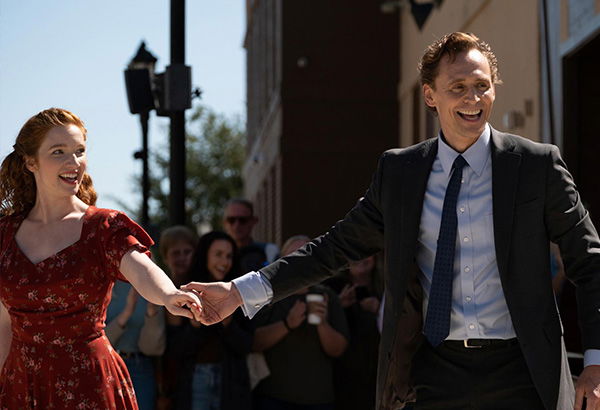
What if your life didn’t flash before your eyes at the end—but instead played out backwards, chapter by chapter, across a collapsing world and a fading childhood? That’s the intriguing premise behind Life of Chuck, a haunting and unexpectedly beautiful new film adaptation of Stephen King’s short story. Directed by Mike Flanagan and starring Tom Hiddleston in a career-defining performance, Life of Chuck isn’t just a film—it’s a quiet thunderclap of emotion, memory, and existential wonder.
Coming soon to Ster-Kinekor cinemas, this surreal sci-fi drama will leave audiences reflecting long after the credits roll.
No matter where Marty (Chiwetel Ejiofor) turns, he’s haunted by the image of Charles Krantz (Tom Hiddleston). His face is everywhere—on billboards, signs, even flickering across TV screens. But why is this seemingly average accountant being honored like a national treasure? Their connection runs deeper than expected, intertwining with Marty’s ex-wife, her colleague, the next-door neighbor—practically everyone in their orbit. As Chuck’s life story begins to rewind before our eyes, we journey back to his childhood and his bond with his grandfather Albie (Mark Hamill), who taught him the basics of accounting, sparked his love for dancing, and carefully guarded a mysterious secret hidden in the attic.
Very interesting, indeed.
Life of Chuck isn't your average sci-fi-fantasy drama. It’s not about spectacle—it’s about soul. Here’s why this film deserves your full attention:
This is science fiction not with lasers, but with life itself as the battleground.
Don’t expect spaceships or time-travel paradoxes here. Life of Chuck brings genre elements down to Earth, focusing instead on the quiet, unremarkable moments that turn out to be everything. It’s the kind of fantasy that finds magic in the mundane: a sunset on a rooftop, a drumbeat echoing down a city street, the unspoken love between family members.
The film taps into the grandest themes—life, death, regret, joy—all while feeling remarkably intimate. You’ll laugh, reflect, maybe even cry. Because in Chuck’s story, we see a bit of our own: how time moves us, bends us, and eventually returns us to where we started.
Flanagan and cinematographer Eben Bolter craft a visual language that’s lyrical, dreamlike, and deeply immersive. Light dances across rooms. Childhood memories shimmer. The sound design draws you inward, whispering truths you didn’t know you needed to hear.
This film deserves your undivided attention—and a massive screen to match its emotional scope. That’s where Ster-Kinekor comes in.